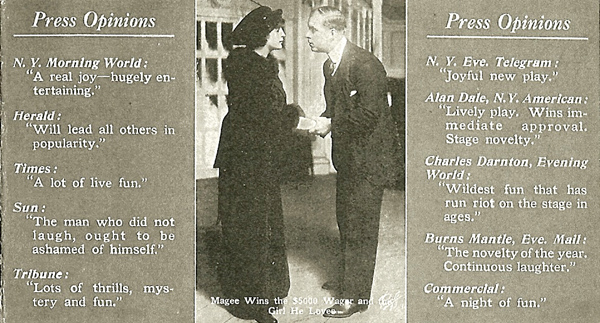George M. Cohan In America's Theater | home
Stageography | What's New | George Washington, Jr. | The Merry Malones | Broadway Jones | 45 Minutes From Broadway | About Me | The Little Millionaire | Little Nellie Kelly | The Tavern | Seven Keys To Baldpate | Ah, Wilderness! | Get Rich Quick Wallingford | The Royal Vagabond | Discography & Filmography | Early years: 1878-1900 | Broadway Rise: 1900-1909 | Broadway Emperor: 1910-1919 | Decline & Fall: 1920-1929 | Little Johnny Jones | I'd Rather Be Right | Broadway Legend: 1930-1978 | Mailbag/Contact Me | Related Links | Articles & Thoughts | The Yankee Prince
Opened: September 22, 1913
The Astor Theater, NYC

Original Cast:
William Magee......................................Wallace Eddinger
Elijah Quimby.........................................Edgar Halsteaad
John Bland.............................................Purnell Pratt
Mary Norton...........................................Margaret Greene
Mrs. Rhodes..........................................Lorena Atwood
Peter, the Hermit...................................Joseph Allen
Myra Thornhill........................................Gail Kane
Jim Cargan............................................Martin Alsop
Thomas Hayden....................................Claude Brooke
Jiggs Kennedy.......................................Carlton Mary
The Owner Of The Baldpate Inn...........John C. King
Synopsis:
Novelist, Billy Magee makes a wager with his wealthy friend that he can
write a novel in 24 hours given the proper circumstances. He is given a
key to the Baldpate Inn, and is told that it is the only one (as it turns out,
there are seven different people who claim ownership of the only key).
At the Inn, he foils a plot to pay off a group of criminals, and just before
midnight, learns that the entire plot is a hoax (put on by his wealthy
friend to keep him from completing the novel.)
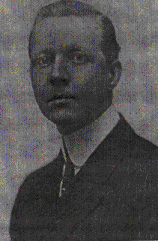
Wallace Eddinger star of
"Seven Keys To Baldpate"
Critic's Corner:
"This play is a novelty in many ways. An author who writes novels in the class of
the "best sellers" makes a wager with a friend that he can write a book of that
kind which would fall under the class of "best sellers" inside of twenty-four hours.
...Necessarily, the acting of this ingenious story had much to do with its pleasant
and impressive effect.
Wallace Eddinger was the novelist. All the acting parts are good, and the cast
was chosen with that unerring discrimination of a good stage-manager, such as
Mr. Cohan is. Gail Kane, as the blackmailing woman, deserves praise. Margaret
Greene is excellent as the reporter, as also Jessie Graham, as the wife of the
caretaker."
Theater Magazine - November 1913
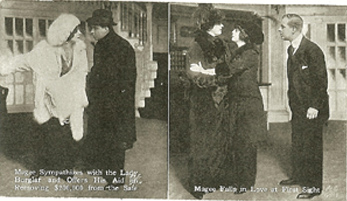
“Cohan and Harris, when they produced Augustin MacHugh's `Officer 666' at the
Gaiety, may be said to have Luther Burbanked into existence a new kind of
entertainment. Our drama is full of hybrids. We have musical plays, and serio-comic
plays, and farce comedy, but in the theater, as in zoology, cross breedings between
different genera are rare; hence one marvels at the instant success of melodramatic
farce. The climax in the production of this species has been reached in George M.
Cohan's adaptation of Earl Derr Biggers' `Seven Keys To Baldpate,' which is attracting
large audiences to the Astor.
`Seven Keys To Baldpate' is a frenzied farce and melodrama gone mad. For good
measure, it is whimsy and satire and that sort of April-fooling, of rounding on one's
work and making fun of it, which Mr. Cohan practiced first in `The Man Who Owns
Broadway.' It is a play within a play within a play, with the characters in each separate
play laughing at those in all the other plays. William Hallowell Magee arrives at
Baldpate Inn, that `lonesomest spot on earth - summer resort in winter,' to win a bet
from its owner by beginning a novel at midnight one day and completing it by midnight
the next. The arrival is shown in a prologue. The piece proper, which is in two acts,
discloses Mr. Magee as the central figure in a succession of exciting incidents that keep
him exceedingly busy without giving him the least chance for literary effort. These
incidents he ridicules constantly, observing that he has written most of them a hundred
times in trashy novels but that he never believed they could occur in real life. Finally, the
proprietor of the inn turns up to confess that the melodrama has been bogus - that, to
win his wager, he hired the members of a touring company to represent the scoundrels
who have bothered Magee. Thus, Mr. Cohan puts his whole story in parentheses, nor
does he rest content until the parentheses themselves are enclosed in brackets. The
curtain falls upon a stage crowded with practical jokers, all laughing at the admission
of the hotel-owner, and immediately rises again to disclose vacancy and darkness.
From an upstairs room sounds the clatter of a typewriter. The town clock strikes twelve.
Magee is finishing his book, and everything you have seen before, including the
confession that nothing really happened, has to be set down in volume.
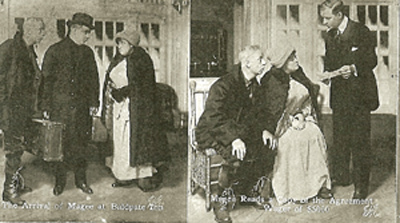
The amazingly ingenious scheme of the piece suggests those wooden eggs, contained
by one inside another, that used to be imported from China. `Seven Keys To Baldpate'
is a play and a burlesque of that play synchronized. Its authors deride the trashy
melodrama, in melodrama, and then justify melodrama by showing real life to be full of
melodrama. Finally, they justify themselves and defy criticism in a brilliant bit of effrontery.
`The critics will roast the tar out of it,' says Magee of his story, which, of course, is also the
story in which he appears, `but this is the stuff the public wants.' In addition to being an
author, a composer, an actor, a dancer, a director and a producer, Mr. Cohan stands
revealed as a profit, for the crowds at the Astor prove his `mystery farce' to be truly
`the stuff the public wants.'
Not even `Within The Law,' with its remarkable richness of plot and incident, displays the
fertility of `Seven Keys To Baldpate.' Four times over, I might solve the problem of filling
my allotted space in `The Green Book' if it were possible to remember all the
complications of this gatling-gun drama. Lucid as the narrative seems in its unfolding, the
mind that carried it away must needs be like Artemus Ward's van, in which, after packing
all his other belongings, the owner packed the van himself. I have told you of the coming
to Baldpate of William Hallowell Magee. Let us go on from that point and see what we
shall see.
Mr. Magee hardly has gone in to his room, secure in the belief that he possesses the
only key to the inn, when there enters John Bland, `right hand man' of a millionaire street
railway builder, with two hundred thousand dollars to put in the hotel safe. Later on, Jim
Cargan, Mayor of Reuton, is to call for the money, and, in return, is to give a curtain
franchise to the railway builder, whose name, by the way, is Thomas Haydan. Surprised
by the novelist, Bland presses his revolver against the digestive organs of Magee, who
declines to be frightened because, as he remarks, `I've written this situation over and
over again.' By a sharp trick, he entraps the bribe giver, and locks him in an upstairs
room, only to be confronted by an intruder with a third key - Mary Norton, a newspaper
reporter on the trail of the story. Mary is accompanied by Mrs. Rhodes, the fiancée of the
Mayor. Bill falls in love with the reporter at sight. Myra Thornhill, working in conjunction
with Lou Max, accomplice of the Mayor, lets herself in with a fourth key, and is toying with
the safe combination, when the heroic author bids her stand and deliver. Myra persuades
him of the honesty of her motives, and he promises to get the money for her. The same
promise he makes later to Mary, who needs that two hundred thousand as evidence; and
then the inn is invaded by Cargan, and Max, and the escaped Bland. In spite of them,
Magee secures the incriminating roll turns it over to Mary, and, outwitting the quintette of
villains, compels them to sit in a minstrel first-part semicircle staring at the audience until
the telephone shall notify him that the woman he loves is safe at the office of her
newspaper.
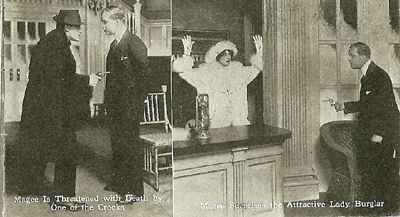
Here occurs one of those occasional out-croppings that prove Mr. Cohan to be something
more than a surface observer of human nature. Facing defeat and imprisonment, the five
scoundrels turn on one another. Hayden calls Bland a `blockhead.' Bland retorts in kind.
Cargan accuses Max of having `double-crossed' him for the sake of Myra, and Myra
admits that she means to `triple-cross' Max. `Myra!' pleads Max. And the lady in question
tosses her head, and ejaculates: `Ah, you go to hell.' Finally, Peter, the half-crazed hermit
of Baldpate, who has been included in the haul, caps the climax by snarling: `I hope to God
you're all sent to prison for life!'
When the curtain falls upon this picture it would puzzle the shrewdest guesser to say with
what material the dramatist might piece out a scanty second act. Piece out a second act
he does, however, and not a scanty one either. Mr. Cohan discloses himself as the
greatest misanthrope since Mark Twain wrote `The Man Who Corrupted Hadleyburg.'
Everyone who comes in contact with the two hundred thousand dollars instantly turns
`crook.' Mary telephones that she has lost the `roll.' It has been stolen by Mrs. Rhodes. Max
shoots Myra, for `squealing,' and the shot brings in the town chief of police. A moment
later the money is located. The officer of the law takes possession of it, and then
telephones his wife to meet him the next morning in Canada. `I hope you freeze to death!'
exclaims the hermit, who, a second later, has seized the greenbacks and thrown them into
the fire. Then the dead Myra promenades around the balcony of the inn, and just as the
audience is concluding that it has gone stark mad, comes the confession of the owner of
Baldpate. What follows in the epilogue already has been described.
`Seven Keys To Baldpate' is sparklingly played, Wallace Eddinger impersonating Magee
with all the facility and charm of his skill and youth. Joseph Allen's performance of the
hermit is broadly amusing, and yet admirably accurate in detail. Gail Kane, as Myra, is
piquant and convincing, while each of the other ten members of the cast acquits himself
or herself with distinctin. The staging and the single stage settings are unique and as
striking as the piece. `Seven Keys To Baldpate' does not pretend to profundity, philosophy
or literary merit, but it is the cleverest play I have ever seen.”
Channing Pollock - “The Green Book,” December 1913

"In the laughing, venturesome plot of 'Seven Keys To Baldpate,' George M. Cohan's
mystery farce that has been reigning New York and Chicago success the past season,
theater goers find a genuine, dead in earnest melodrama intentionally gone wrong
to the point of sidesplitting burlesque under a cover of seriousness that is not removed
until just before the last curtain falls. In fact, 'Seven Keys To Baldpate' is pure
melodrama plus refinement and an additional element of satirical humor that is as
delightful as it is unusual.
Critics have said that not in years has such a combination of tense scenes and
dramatic situations found their way to the stage via an American author's pen.
Mystery and thrills are rampant in Mr. Cohan's latest offering, which discloses
the versatility of this genius of the drama in his most confident mood, and the
mystery and thrills are all the more enjoyable for the undercurrent of the laughter
that trails the unfolding of the plot which Cohan made into play form from the
story of the same name by Earl Derr Biggers.
In its stage dress the strength of the story is accentuated by its actuality, though
Cohan fools his audiences to the top of his bent. At the opening of the play
one learns that William Hallowell Magee, a novelist, has made a wager of
$5,000 that he can write a 10,000 word story in twenty-four hours, the only
stipulation being that he can find the 'lonesomest spot on earth' in which to
complete his task.
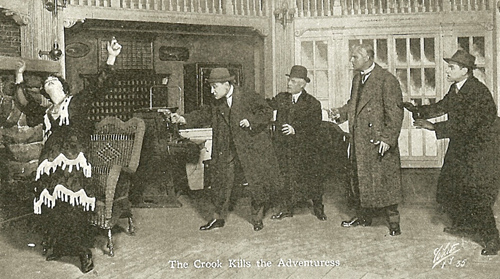
In a brief prologue Magee is discovered arriving at the aforesaid lonesome
spot - Baldpate Inn, a summer hotel closed for the winter - and the prologue ends
with the accompanying clatter of his typewriter as he begins his literary task.
At once the hero is surrounded by a circle of sensational incidents, and for
two gripping acts the audience sees Magee the center of a gang of political
scalawags, ex-convicts, adventuresses, ghosts and detectives, who thicken
the plot with so much adroitness that its unraveling seems well nigh hopeless,
but the author Cohan accomplishes with the cleverness born of intimate knowledge
of stage craft.
That 'Seven Keys To Baldpate' is Cohan's best play down to date is the opinion
expressed by many reviewers. If it had been imported from England without
the name of the author shrew guessers would have supplied that of George
Bernard Shaw and perhaps acclaimed it as the cleverest bit of satire in a decade.
Mr. Cohan is responsible for its classification as a mystery farce, but we suspect
that this is another evidence of his cleverness and devised solely to attract
the more fickle of is public.
As a matter of fact, 'Seven Keys To Baldpate' is one of the keenest satires ever
contributed to the American theater - a satire cutting to the heart of absurdities
and exposing its secrets with relentless detail and yet with a droll manner of a
genial humorist rather than that of a bitter critic of life.
'Seven Keys To Baldpate' defies criticism, explanation or interpretation. One
pen has written that 'it even defies reporting,' but the fact remains that it is
unquestionably one of the best entertainments that has been furnished these
United States in a month of leap years, and attributes that make it such laughter,
thrills and mystery in a riproaring melodrama presented in the guise of farce."
The Augusta Herald - Sunday, March 7, 1915
Cohan's Recollection:
"Eventually, we had a lot of shows, and a lot of theaters. And I remember
when we started to accumulate our theater interests, I remember I went to
my father, I was a little bit worried about becoming too involved, I told him
what we were doing. I asked him, I said, 'Do you think we ought to hang
on to these theaters?' And I remember my father's advice, I remember it
very well. He said, 'Well, I don't know much about whether or not you
ought to hang on to these theaters, but you take my tip kid and hang on
to your dancing shoes.'"
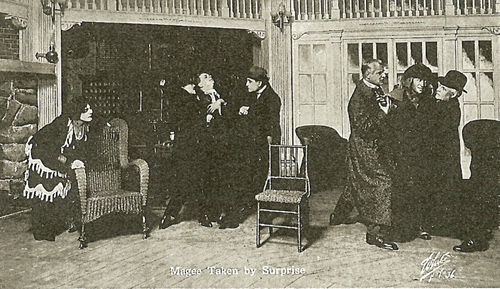
__________________________________
"We opened "Baldpate" at the Astor Theater in 1913. The panic was on.
Help! Murder! Police! Cries of anguish. Roars of disapproval. Critics, playwrights,
Drama Leaguers, and literary ladies and gentlemen of all sorts, sizes, and
standing stood on their hind legs and denounced the dramatization instanter.
'He's tearing down traditions.'
'He's breaking all rules and regulations of play construction.'
'He's insulting the intelligence of the public.'
The entire regiment aimed and fired.
'What's the matter? What have I done?' I innocently inquired of a well-known
playwright (Augustus Thomas) who had attended the opening night performance.
'You know what you've done, don't you?'
'I certainly do not,' I confessed.
'On what lines have you usually constructed your plays?' he asked.
'Mostly on the Pennsylvania and New York Central,' I replied.
He immediately reported to "the circle" that Cohan was a hopeless hick.
The public flocked to "Baldpate." They came in hacks and packs and stacks.
Capacity for the entire season. Another company presented the play in Chicago.
Same thing out there. All farce records broken."
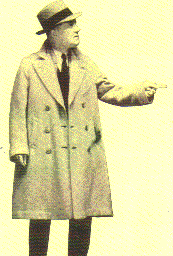
Cohan as Magee in the
1935 Revival
Notes:
Based on the novel by Earl Derr Biggers, (who later went on to write the
adventures of Charlie Chan) "Seven Keys To Baldpate" is easily
Cohan's most popular play. While he is known mostly for his musical
contributions, "Seven Keys" has been revived and filmed many, many times.
Cohan himself starred in the first filmed version (1917) & starred in the
revival in 1935 for the Player's Club. In films, the story was remade 5
more times with the latest film adaptation being the "House Of Long
Shadows" (1983) with such film greats as Christopher Lee, Vincent Price,
John Carradine, and Peter Cushing. The play has been so popular that
it is included in almost every volume of best plays of the early 20th Century.
The play itself has a trick ending. Just after the end of the final act, the
curtain rises once again to show Magee telling his friend Hal Bently (via
telephone), that he has just completed the mystery novel. (This tells the
audience that the entire play that they just saw was Magee's novel).
For the leading role Magee, Cohan fashioned the part after is own struggles
in the theater. Magee is a smart, quick-witted writer of popular novels, that
is adored by the public and dismissed by the critics.
